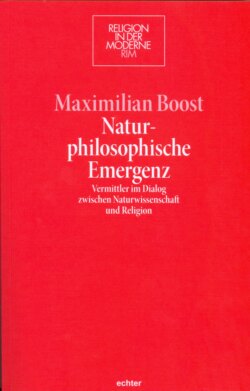Читать книгу Naturphilosophische Emergenz - Maximilian Boost - Страница 18
4.2 Conwy Lloyd Morgan: „Emergent Evolution“
ОглавлениеIn „Emergent Evolution“ (1923) beschreibt Lloyd Morgan seine Theorie evolutiver Emergenz. Auch für Lloyd Morgan ist Neuartigkeit ein wesentliches Merkmal seines Emergenzbegriffs. So hebt sein Hauptwerk mit den Worten an:
„We live in a world in which there seems to be an orderly sequence of events. […] But the orderly sequence, historically viewed, appears to present, from time to time, something genuinely new. Under what I here call emergent evolution stress is laid on this incoming of new.“81
Wie er selbst betont82, gründet sein Emergenzbegriff auf den Theorien von Mill und Lewes – besonders ersterem –, so dass es nicht überraschen kann, dass er gleich sein erstes Beispiel für Emergenz aus dem Bereich der Chemie nimmt:
„When carbon having certain properties combines with sulphur having other properties there is formed, not a mere mixture but a new compound, some of the properties of which are quite different from those of either component.“83
Nach Lloyd Morgan kommt die Emergenztheorie ohne über-natürliche Phänomene aus:
„[T]hat it [the emergence] can only be explained by invoking some chemical force, some vital élan, some entelechy, in some sense extra-natural, appears to us to be questionable metaphysics.“84
Dennoch können die emergenten Phänomene nicht durch mechanische Sätze erfasst werden und sind ihm daher mit derselben ‚natural piety‘ wie schon bei Alexander zu betrachten:
„Under naturalistic treatment, however, the emergence, in all its ascending grades, is loyally accepted, on the evidence, with natural piety. That it cannot be mechanically interpreted in terms of resultants only, is just that for which it is our aim to contend with reiterated emphasis.“85
Zudem vertritt auch er – in einer stärkeren Variante als Alexander – die Unvorhersagbarkeit der emergenten Phänomene. So präzisiert Lloyd Morgan seinen Ansatz:
„The point of emphasis, however, is this. Let there be three successive levels of natural events, A, B, and C. Let there be in B a kind of relation which is not present in A; and in C a kind of relation, not yet present in B or in A. If then one lived and gained experience on the B-level, one could not predict the emergent characters of the C-level, because the relations, of which they are the expression, are not yet in being. Nor if one lived on the A-level could one predict the emergent character of b-events, because ex hypothesi, there are no such events as yet in existence. What, it is claimed, one cannot predict, then, is the emergent expression of some new kind of relatedness among pre-existent events. One could not foretell the emergent character of vital events from the fullest possible knowledge of physico-chemical events only […].“86
